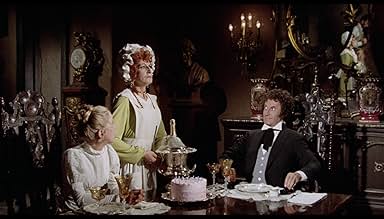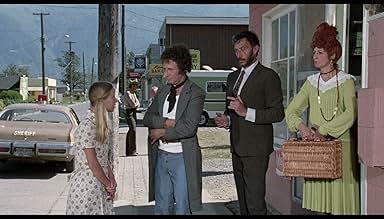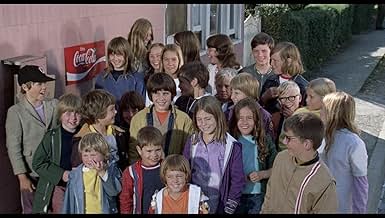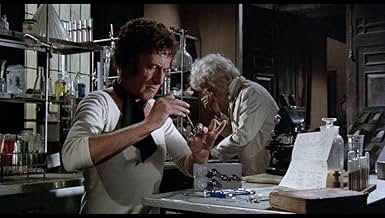A mute puppeteer uses a deceased scientist's invention to control dead bodies like puppets.A mute puppeteer uses a deceased scientist's invention to control dead bodies like puppets.A mute puppeteer uses a deceased scientist's invention to control dead bodies like puppets.
- Nominated for 1 Oscar
- 1 nomination total
- Director
- Writer
- All cast & crew
- Production, box office & more at IMDbPro
Featured reviews
Producer-director William Castle may have too often been dismissed in critical circles as a Grade Z Hitchcock or for having been little more than a gimmick-laden showman during his peak years, but nobody could have sensibly predicted that he would eventually be saving his greatest trick for last; in fact, SHANKS was Castle's directorial swan-song and it might well be his best film as well!
The artform of the mime is one that, understandably perhaps, hasn't been treated much on the silver screen (in this way, it elicits comparison with the classic ballet-oriented THE RED SHOES [1948] which, similarly, adopted a stylized look throughout mixed with an adroit sense of the macabre); the most famous example is, of course, Jean-Louis Barrault's unforgettable Baptiste in Marcel Carne's LES ENFANTS DU PARADIS (1945) and Marcel Marceau (who has died fairly recently) can be said to be the only mime artist that is renowned worldwide. Consequently, it comes as little surprise to see him feature in a couple of cult movies over the years Roger Vadim's BARBARELLA (1968) and Mel Brooks' all-star comedy SILENT MOVIE (1976), where his presence extended to just a cameo in which, ironically, he utters the only word of dialogue in the whole movie!
SHANKS is another thing entirely: Marceau not only has a dual role and does the choreography but, for the most part, is virtually the whole show. As on-screen support, he has three talented actors Tsilla Chelton and Philippe Clay (who are very adept at miming themselves) and the young Cindy Eilbacher. The film was produced by Steven North, son of composer Alex who received another Oscar nomination (his twelfth) for his brilliantly inventive score by turns playful, poignant and brooding which, in a film like this, with very little dialogue and the intermittent use of intertitles, is as important as the on-screen characters themselves. Castle (who even has an amusing, unbilled cameo as a storekeeper) also employed other renowned Hollywood veterans behind the camera here, namely cinematographer Joseph Biroc (their third collaboration) and production designer Boris Leven.
The film itself has rightly been described as one of the strangest ever made (the subtitle "A Grim Fairy Tale" is most apt!): it deals with a deaf-mute puppeteer (Marceau, naturally) who, abused by his harridan sister and her boozing partner, takes comfort in his friendship with a little girl he meets at the fair and an eccentric dying scientist (also Marceau, made up to look almost Caligari-like) who experiments with reanimating dead bodies (most notably a frog) via two portable electronic devices. After the scientist dies and is buried, the puppeteer takes possession of the re-animating devices himself and, inevitably, they come in handy when his relatives die (one he kills himself in self-defense at the scientist's mansion with the help of a re-animated rooster and the other when beside herself at Marceau's lateness is mowed down by a speeding car outside their house in the middle of the night!); he takes them shopping and has them wait on him and perform tricks when he invites the girl to the doctor's mansion! Their idyllic tryst is short-lived, however, when a gang of bikers burst in on them to treat a wounded member of their party
Watching SHANKS (which is the puppeteer's surname, by the way) right after Robert Hartford-Davis' CORRUPTION (1968), I couldn't help but be reminded of that film's analogous last segment (right down to the 'dreamy' coda); here, however, Castle has a trump card up his sleeve when a biker steals one of the doctor's electronic devices and fools around with the zombified 'servants' the puppeteer, on the other hand, re-animates the scientist who, together with the servants now back in his control, beat up the gang. The narrative seems simple enough on paper, but the film is very much a unique experience (albeit an acquired taste, given the occasional longueurs brought on by its deliberate pace) amusing, surreal, weird and disturbing. Certainly among the highlights is the puppeteer's re-animation of the scientist whose movements made me think of a Jekyll/Hyde transformation as performed by Jimmy Cagney!!
Unfortunately, the print quality left much to be desired: it seemed like a tenth-generation VHS copy, with the detail all soft and fuzzy and the picture excessively dark to boot; being a Paramount film, one hopes that Legend Films or, better still, Criterion will eventually get the opportunity to give this bizarre gem a decent release and, consequently, the exposure it greatly deserves since Paramount themselves seem unwilling to do anything with it!
The artform of the mime is one that, understandably perhaps, hasn't been treated much on the silver screen (in this way, it elicits comparison with the classic ballet-oriented THE RED SHOES [1948] which, similarly, adopted a stylized look throughout mixed with an adroit sense of the macabre); the most famous example is, of course, Jean-Louis Barrault's unforgettable Baptiste in Marcel Carne's LES ENFANTS DU PARADIS (1945) and Marcel Marceau (who has died fairly recently) can be said to be the only mime artist that is renowned worldwide. Consequently, it comes as little surprise to see him feature in a couple of cult movies over the years Roger Vadim's BARBARELLA (1968) and Mel Brooks' all-star comedy SILENT MOVIE (1976), where his presence extended to just a cameo in which, ironically, he utters the only word of dialogue in the whole movie!
SHANKS is another thing entirely: Marceau not only has a dual role and does the choreography but, for the most part, is virtually the whole show. As on-screen support, he has three talented actors Tsilla Chelton and Philippe Clay (who are very adept at miming themselves) and the young Cindy Eilbacher. The film was produced by Steven North, son of composer Alex who received another Oscar nomination (his twelfth) for his brilliantly inventive score by turns playful, poignant and brooding which, in a film like this, with very little dialogue and the intermittent use of intertitles, is as important as the on-screen characters themselves. Castle (who even has an amusing, unbilled cameo as a storekeeper) also employed other renowned Hollywood veterans behind the camera here, namely cinematographer Joseph Biroc (their third collaboration) and production designer Boris Leven.
The film itself has rightly been described as one of the strangest ever made (the subtitle "A Grim Fairy Tale" is most apt!): it deals with a deaf-mute puppeteer (Marceau, naturally) who, abused by his harridan sister and her boozing partner, takes comfort in his friendship with a little girl he meets at the fair and an eccentric dying scientist (also Marceau, made up to look almost Caligari-like) who experiments with reanimating dead bodies (most notably a frog) via two portable electronic devices. After the scientist dies and is buried, the puppeteer takes possession of the re-animating devices himself and, inevitably, they come in handy when his relatives die (one he kills himself in self-defense at the scientist's mansion with the help of a re-animated rooster and the other when beside herself at Marceau's lateness is mowed down by a speeding car outside their house in the middle of the night!); he takes them shopping and has them wait on him and perform tricks when he invites the girl to the doctor's mansion! Their idyllic tryst is short-lived, however, when a gang of bikers burst in on them to treat a wounded member of their party
Watching SHANKS (which is the puppeteer's surname, by the way) right after Robert Hartford-Davis' CORRUPTION (1968), I couldn't help but be reminded of that film's analogous last segment (right down to the 'dreamy' coda); here, however, Castle has a trump card up his sleeve when a biker steals one of the doctor's electronic devices and fools around with the zombified 'servants' the puppeteer, on the other hand, re-animates the scientist who, together with the servants now back in his control, beat up the gang. The narrative seems simple enough on paper, but the film is very much a unique experience (albeit an acquired taste, given the occasional longueurs brought on by its deliberate pace) amusing, surreal, weird and disturbing. Certainly among the highlights is the puppeteer's re-animation of the scientist whose movements made me think of a Jekyll/Hyde transformation as performed by Jimmy Cagney!!
Unfortunately, the print quality left much to be desired: it seemed like a tenth-generation VHS copy, with the detail all soft and fuzzy and the picture excessively dark to boot; being a Paramount film, one hopes that Legend Films or, better still, Criterion will eventually get the opportunity to give this bizarre gem a decent release and, consequently, the exposure it greatly deserves since Paramount themselves seem unwilling to do anything with it!
Here is a film I had wanted to see for some time and finally tracked down a low-quality bootleg video of. I am quite a fan of unusual films like this, although unlike the works of David Lynch or Alejandro Jodorowsky, the weirdness of this film comes naturally from the storyline and not from any intentional strangeness just for the sake of strangeness. William Castle has created a neat, compact, self-contained movie universe here, with the setting being an odd juxtaposition between a dark Gothic castle and sunny Northern California. I couldn't help but be reminded of Tim Burton's "Edward Scissorhands", another modern fairy tale about a mad but gentle genius and his near-mute misfit assistant in a dark old castle surrounded by a sunny '50s style suburbia. In fact, call me crazy, but I will bet that Burton has seen this film before and was possibly inspired by it while making his own film. There are other similarities to that film: the genius dies leaving the misfit to fend for himself in the outside world, the villains are in a motorcycle gang, the misfit falls for a local blond teenage girl, and he also performs his "magic" for children in a school classroom. Also like the films of Burton, there is a mixture of visual motifs from the past and present, including silent-movie style story-cards, Alex North's heady music score, and a motorcycle gang.
Sadly missing, though, is a highly compelling storyline, but in this case style over substance is not such a bad thing. This film is hard to classify, as it is not completely horror, modern fairy tale, or art film. I think it would be best to classify it as an experimental curio - one of those films like "Eraserhead", Jacques Tati's "Playtime", "Cabinet of Dr. Caligaryi", or "El Topo", which have no conventional film equivalent yet continue to garner a following from a small group of adventurous filmgoers. If you are attracted to films such as these, you will not be disappointed with "Shanks."
Sadly missing, though, is a highly compelling storyline, but in this case style over substance is not such a bad thing. This film is hard to classify, as it is not completely horror, modern fairy tale, or art film. I think it would be best to classify it as an experimental curio - one of those films like "Eraserhead", Jacques Tati's "Playtime", "Cabinet of Dr. Caligaryi", or "El Topo", which have no conventional film equivalent yet continue to garner a following from a small group of adventurous filmgoers. If you are attracted to films such as these, you will not be disappointed with "Shanks."
Shanks is the final film of director William Castle; a man famous for his gimmicky horror films. This film breaks away from many norms and that has lead to it being called 'weird' by many that have seen it - but to me, this is Castle doing what he always does, namely making a film full of gimmicks...only this time the gimmicks don't work so well and the film is not much better than passable. Apparently Castle was going for a sort of grim fairy tale feel; but unfortunately he wasn't able to capture it, partly due to some truly lacklustre performances, but also because of the dull script and plotting. The film focuses on Malcolm Shanks; a deaf and mute puppeteer who lives with his sister and her boyfriend who abuse him. He is forced to get a job, and finds one with a mad doctor who is doing experiments on the dead in which he attempts to bring them back to life. Our hero's job is to move the corpses like he does his puppets. However, when the doctor turns up dead; the puppeteer seeks revenge on those he dislikes.
The first gimmick featured is the casting of the central character - Marcel Marceau, a famous mime. Secondly, Castle tells his story via the use of storyboards which gives the film a silent movie type atmosphere. This fits the central character as he's a mute and thus doesn't speak; but it doesn't really serve any relevance to plot and feels like weirdness simply for the sake of it. The lead character is also really difficult to get into, which is a huge flaw because the plot isn't nearly interesting enough to carry the film on its own. The idea of reanimating the dead is about as morbid as it gets; but it's all done in a kind of pantomime fashion and this saps all the horror from the story; leaving the audience with nothing much to do other than roll their eyes at most scenes. The film is very difficult to find (unsurprisingly it hasn't been given a wide release like most of Castle's oeuvre) and I'm not really surprised at that. I can give plaudits to the film for some of the ideas on display, the originality and the score which is excellent; but really this is far too uneven to be successful and I can't say it's really worth going to the trouble of tracking down.
The first gimmick featured is the casting of the central character - Marcel Marceau, a famous mime. Secondly, Castle tells his story via the use of storyboards which gives the film a silent movie type atmosphere. This fits the central character as he's a mute and thus doesn't speak; but it doesn't really serve any relevance to plot and feels like weirdness simply for the sake of it. The lead character is also really difficult to get into, which is a huge flaw because the plot isn't nearly interesting enough to carry the film on its own. The idea of reanimating the dead is about as morbid as it gets; but it's all done in a kind of pantomime fashion and this saps all the horror from the story; leaving the audience with nothing much to do other than roll their eyes at most scenes. The film is very difficult to find (unsurprisingly it hasn't been given a wide release like most of Castle's oeuvre) and I'm not really surprised at that. I can give plaudits to the film for some of the ideas on display, the originality and the score which is excellent; but really this is far too uneven to be successful and I can't say it's really worth going to the trouble of tracking down.
When one thinks of Marcel Marceau they think of the world's most famous mime. A performer who has entertained millions of people throughout the years with his mastery of pantomime. You certainly don't think of him as a manipulator of dead bodies!! But that's what he is here in this very strange film. He plays Malcolm Shanks, a mime who loves to entertain the neighborhood children. He lives with his sister & brother-in-law who are a shrew & a drunk & abuse him constantly. He is hired by a scientist who has perfected the art of reanimating the dead. I must stop for a second and let anyone who is reading this know that the film, while it sounds intriguing, doesn't play out the way you would think. It is at heart a fairy tale. A morality story perhaps. But most definitely NOT a horror story. To continue, The scientist dies & having learned his secrets while working with him, Malcolm reanimates his corpse & becomes very proficient at it. I'm not gonna get any deeper into it at this point. Suffice it to say that more than a few people get their corpses reanimated by Malcolm and no good can come from that.....
Marceau plays both Malcolm & The Scientist(Walker) & performs admirably in both roles. There is a scene where Malcolm learns to animate Walker's facial muscles that is very effective. He goes from slack-jawed to smiling so slowly & eerily that at first you think the film is frozen. Almost like time lapse photography. It really shows off Marceau's expertise. There is very little dialogue in the film. It plays like a silent film(It even has title cards)because it is 90% silent. The score by Alex North is therefore very important to the tone of the film, & it is very effective in conveying the mood that the filmmakers were trying to achieve. It was so effective it was nominated for an academy award.
I enjoyed the film but there are VERY SLOW PASSAGES in it. So slow that it will turn many people off. It also ends very curiously. It is a very odd but lyrical film that is a great attempt at a Grim fairy tale. But ultimately it fails because of it's terrible pacing & low budget. You might dig it if you're willing to accept it's idiosyncracies. If not...well give it a try anyway. Who knows??
Marceau plays both Malcolm & The Scientist(Walker) & performs admirably in both roles. There is a scene where Malcolm learns to animate Walker's facial muscles that is very effective. He goes from slack-jawed to smiling so slowly & eerily that at first you think the film is frozen. Almost like time lapse photography. It really shows off Marceau's expertise. There is very little dialogue in the film. It plays like a silent film(It even has title cards)because it is 90% silent. The score by Alex North is therefore very important to the tone of the film, & it is very effective in conveying the mood that the filmmakers were trying to achieve. It was so effective it was nominated for an academy award.
I enjoyed the film but there are VERY SLOW PASSAGES in it. So slow that it will turn many people off. It also ends very curiously. It is a very odd but lyrical film that is a great attempt at a Grim fairy tale. But ultimately it fails because of it's terrible pacing & low budget. You might dig it if you're willing to accept it's idiosyncracies. If not...well give it a try anyway. Who knows??
I am sure the cult followers of this film will not like my review, but that's partly what makes this film a cult classic--either you like it or you don't. Even with nothing else to do on a late Friday night, and a stiff drink, a bag of chips, and the need to escape from the cares of the week, I found myself flipping to other channels during the painfully slow segments of this film. The (un)editing and overall incredibly slow flow of this story made it a struggle to stay tuned in. If properly edited, it could have easily been a half-hour "Tales from the Dark Side." In fact, the quality of the shots and lighting made me convinced that it was a made-for-TV film.
All that said, it's interesting to see the movie once, as if it was assigned in a "70s film appreciation" class. But be prepared with something else to do--like sorting receipts for taxes, or playing solitaire.
You may find yourself yelling at the screen--"How many times does the editor have to cut back to his face? We've got the point! Now move on with the action!!!" and, "could he walk down that hallway any slower???" My favorite part of the movie was watching the great body movement of the actors who played the re-animated zombies. And it's funny that Marcel was NOT the best one of these!
All that said, it's interesting to see the movie once, as if it was assigned in a "70s film appreciation" class. But be prepared with something else to do--like sorting receipts for taxes, or playing solitaire.
You may find yourself yelling at the screen--"How many times does the editor have to cut back to his face? We've got the point! Now move on with the action!!!" and, "could he walk down that hallway any slower???" My favorite part of the movie was watching the great body movement of the actors who played the re-animated zombies. And it's funny that Marcel was NOT the best one of these!
Did you know
- TriviaAlex North used parts of his rejected score for 2001: A Space Odyssey (1968) for this film. For example, the main title music was originally composed for the space station phone call sequence of 2001, but here rearranged with a female vocalist added.
- GoofsAfter Mrs. Barton moves Celia's placemat, Malcolm cocks her body to her left. In the following shot, she's cocked to her right.
- Crazy creditsRight before the closing credits roll, a quote from William Makepeace Thackeray is featured: "Let us shut up the box and the puppets, for our play is played out."
- ConnectionsFeatured in Spine Tingler! The William Castle Story (2007)
- How long is Shanks?Powered by Alexa
Details
Contribute to this page
Suggest an edit or add missing content
















